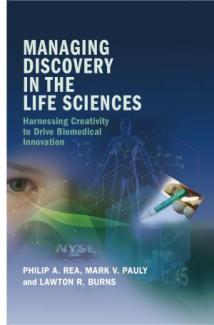
By Philip A. Rea, Mark V. Pauly, Lawton R. Burns
Featured on Mastering Innovation, originally aired on Sirius XM Channel 111, Business Radio Powered by The Wharton School.
Managing Discovery is a book that owes its orgins to the LSM Program. It is through this program that the three authors – Dr. Rea, a biochemist, Dr. Pauly, an economist, and Dr. Burns, a sociologist by training - found their research and pedagogical activities converging on the management of life sciences as it applies to the interface between discoveries made in the research laboratory and their realization in the marketplace. Therein is the core of this book: a set of case studies built out of the life science discovery process that integrate considerations of the basic science and the managerial choices that accompanied each line of investigation. The case studies, many of which started their lives as first drafts researched and written by students and teaching assistants in the program, were framed with an eye to bringing the languages and systems of thought of science and business into one place.
Managing Discovery is concerned with the science and management behind marketable biomedical innovations. It explores how the science actually played out through the interplay of personalities, the cultures within and between academic and corporate entities, and the significance of serendipity not as a mysterious phenomenon but one intrinsic to the successes and failures of the experimental approach. With newly aggregated data and case studies, the fundamental economic underpinnings of investor-driven discovery management are considered, not as an obstacle or deficiency as its critics would contend or as something beyond reproach as some of its proponents might claim, but as the only means by which scientists and managers can navigate the unknowable to discover new products and decide how to sell them so as to maximize the likelihood of establishing a sustainable pipeline for still more marketable biomedical innovations.
This book would not have been possible without the participation not just of those credited with authorship of particular chapters but many others, including industry experts associated with the LSM Program and the students who gave so freely of their time with good humor and a sense of responsibility. Special thanks go to those who performed often thankless tasks - to Dr. Peter Stokes for editorial assistance in helping us achieve a consistent and correct English style, to Allison Hedges in the early stages of this enterprise and Tina Horowitz in the many months that were to follow for formatting the manuscript, assisting with the preparation of publication- quality graphs, charts and tables, and for helping coordinate the efforts of the team of authors who were often heading in different directions, and to Sara Jarret, the medical illustrator who deftly crafted the high-end illustrations. Others who played their part in the early days were Dr. John V. Martin, formerly of the University of Leicester, England, for translating some of the early German pharmacological literature and Irtiqa Fazili who helped with the first drafts of some of the illustrative material. Finally, in taking what started out just as an idea first voiced over lunch at Penne Restaurant, Philadelphia on December 19, 2012, about three years before it was pitched to Cambridge University Press, to completion, the faculty authors wish to take this opportunity to thank each other for reading, rereading, editing, and reading again each of the chapters of what is now a book created in a spirit of cooperation and determination. If nothing else this book is a testament to the fact that scientists and management school faculty really can get on rather well with each other on a joint project of this type.
It goes without saying, and usually it does go unsaid, there are those who through their inestimable patience and understanding gave selflessly of their time in supporting the authors morally and emotionally in this project. They are those most near and dear to them – Jenny, Ames and Ems (Rea), Kitty (Pauly), and Alexandra (Burns).
Praise for the book:
“The authors captured the magic of the biomedical industry from the inception of an idea through translational studies that lead to a product that can transform lives. Case studies illustrate the importance of scientific understanding, long periods of experimentation, willingness to take risks. This book is a ‘must-read’ for anyone who wants to better understand drug discovery.”
– P. Roy Vagelos, M D, Chairman, Regeneron Pharmaceuticals, Inc.
“This new study by Philip A. Rea, Mark V. Pauly, and Lawton R. Burns provides useful information and insightful analyses of the biomedical innovation process.”
– Henry Grabowski, Professor Emeritus of Economics, Duke University
